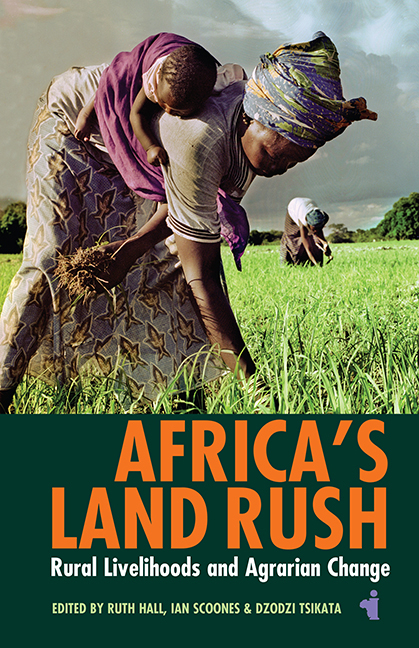Book contents
- Frontmatter
- Contents
- List of Maps, Tables & Figures
- Notes on Contributors
- Preface
- Acknowledgements
- List of Abbreviations
- 1 Introduction: The Contexts & Consequences of Africa’s Land Rush
- 2 State, Land & Agricultural Commercialisation in Kwara State, Nigeria
- 3 Recent Transnational Land Deals & the Local Agrarian Economy in Ghana
- 4 Large-Scale Land Acquisitions in Ethiopia: Implications for Agricultural Transformation & Livelihood Security
- 5 Land Deals & Pastoralist Livelihoods in Laikipia County, Kenya
- 6 Land Deals in the Tana Delta, Kenya
- 7 The State & Foreign Capital in Agricultural Commercialisation: The Case of Tanzania’s Kilombero Sugar Company
- 8 Trapped between the Farm Input Subsidy Programme & the Green Belt Initiative: Malawi’s Contemporary Agrarian Political Economy
- 9 Agrarian Struggles in Mozambique: Insights from Sugarcane Plantations
- 10 South African Commercial Farmers in the Congo
- References
- Index
10 - South African Commercial Farmers in the Congo
Published online by Cambridge University Press: 21 May 2021
- Frontmatter
- Contents
- List of Maps, Tables & Figures
- Notes on Contributors
- Preface
- Acknowledgements
- List of Abbreviations
- 1 Introduction: The Contexts & Consequences of Africa’s Land Rush
- 2 State, Land & Agricultural Commercialisation in Kwara State, Nigeria
- 3 Recent Transnational Land Deals & the Local Agrarian Economy in Ghana
- 4 Large-Scale Land Acquisitions in Ethiopia: Implications for Agricultural Transformation & Livelihood Security
- 5 Land Deals & Pastoralist Livelihoods in Laikipia County, Kenya
- 6 Land Deals in the Tana Delta, Kenya
- 7 The State & Foreign Capital in Agricultural Commercialisation: The Case of Tanzania’s Kilombero Sugar Company
- 8 Trapped between the Farm Input Subsidy Programme & the Green Belt Initiative: Malawi’s Contemporary Agrarian Political Economy
- 9 Agrarian Struggles in Mozambique: Insights from Sugarcane Plantations
- 10 South African Commercial Farmers in the Congo
- References
- Index
Summary
Introduction
In the tropical southern belt of the Republic of Congo, a group of South African commercial farmers have cleared trees and long elephant grass on some parts of their 50,000ha to commence large-scale production of maize. As this case shows, alongside the former colonial powers and Northern economies in the rush for African farmland is a new generation of investors from the ‘emerging economies’. Among these are the BRICS countries, including South Africa. Unlike China and Brazil which have launched bilateral partnerships with many African countries for technical assistance in agriculture, from India and South Africa the main actors are private companies that have secured deals with African governments, often in the form of long-term leases, to expand commercial farming operations in their countries. According to the Land Matrix (2014) database, South African companies have 28 large land deals either under negotiation or concluded in nine countries, with a total area of 679,262ha acquired in the deals concluded. Among these land deals involving South African investors is one brokered by the commercial farmers’ association, Agri South Africa (AgriSA), for 80,000ha of prime farmland in Congo's Niari province, about 200km inland from the port city of Pointe-Noire.
As with many large land acquisitions that are reported in the media, contradictions have emerged in the information regarding this investment. There have been significant discrepancies between ambitious announcements and the area of land actually provided under a legal agreement, and again between the land acquired and the area cleared and cultivated. The deal was initially mooted to involve 10 million hectares, the total area the government claimed was available for investors, but the contract, which was ultimately signed in 2011 by the government of the Republic of Congo and the South African farmers, concerns 80,000ha. The South African farmers initially occupied 50,000ha, with the other 30,000ha to be released by the Minister of Agriculture upon a satisfactory record of harvest. By 2013, only 2,500ha were under cultivation (Land Matrix 2014). But by 2014, three years after taking occupation, with over 5,000ha (10 per cent) under production and finally achieving successful harvests, the farmers reported that the government had released the further 30,000ha to them, on which they would expand in the future (Dirk Hanekom, head of AgriSA's Africa Policy Committee, on the South African television channel Kyknet, 2 October 2014).
- Type
- Chapter
- Information
- Africa's Land RushRural Livelihoods and Agrarian Change, pp. 162 - 180Publisher: Boydell & BrewerPrint publication year: 2015
- 3
- Cited by



